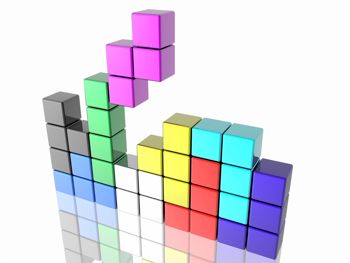A magazine where the digital world meets the real world.
On the web
- Home
- Browse by date
- Browse by topic
- Enter the maze
- Follow our blog
- Follow us on Twitter
- Resources for teachers
- Subscribe
In print
What is cs4fn?
- About us
- Contact us
- Partners
- Privacy and cookies
- Copyright and contributions
- Links to other fun sites
- Complete our questionnaire, give us feedback
Search:
Help the Facebook scientists: be a Tetris teacher

Facebook is a great way to stay connected with your friends. But why would scientists use Facebook? It's the most visited website in the world and a major part of people's daily lives. That means, it also provides a great opportunity for computer scientists to run big experiments involving lots of people from different backgrounds. One group from the University of Amsterdam, Technical University of Delft in the Netherlands and Massachusetts Institute of Technology in the USA are running Facebook experiments that involve teaching machines to play Tetris!
Teach your computer
Artificial intelligence is the stuff of Hollywood movies, where an intelligent machine or robot can do things as well as or even better than humans. Machines that have any amount of intelligence these days are typically trained to do things by being laboriously given instructions or being trained by scientists. There must be a better way.
In the future it's hoped that anyone will be able to teach machines new skills just by interacting with them in a natural way. An inspiration about how this could work is the way we train a pet dog. What would you do if you want your dog to learn to sit, or bring you a ball? The natural way is to give it a reward, like food, whenever the dog does the right thing. If it doesn't ... no reward (and you might even punish it!)
Imagine now teaching a computer to do new things in a similar way! You could teach it to play games, clean your house, or even do the laundry according to your own habits and preferences. This is a big research challenge for computer scientists who are working on understanding how humans and computers should interact in the future.
Take part
The Dutch and US researchers are running an online experiment to help them explore the best ways of teaching intelligent machines. The task they are trying to teach the machine is how to play Tetris. It's done through a Facebook App, called "Intelligent Tetris".
In the experiment, all the trainer does is watch the computer playing and decide whether its placement of each Tetris piece is good or bad. Think a placement is good? Then give it positive feedback. If you think it a bad move, then you give it negative feedback. If the placement is really good, you can even increase the strength of your approval. Likewise, if you think the placement is terrible, you can strengthen your disapproval. The computer learns only when people teach it in this way but every time it gets feedback it learns a little and slowly plays better and better.
What the researchers want to find out is how effective this way of teaching is, and how it might be made more effective. The more people who join in, the stronger the results. So take part and teach a computer Tetris. Invite your friends to join in the fun! Every time you give feedback in the Facebook App you will be helping to slot another piece in place that helps us understand how to teach the machines of the future lots of other things too.


